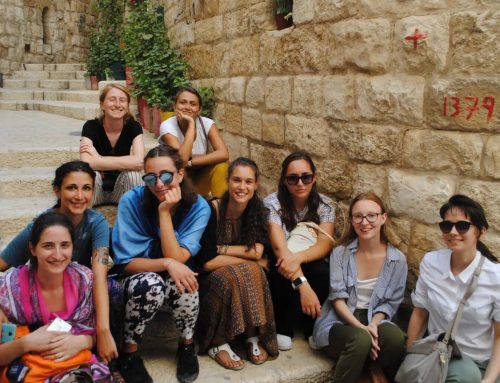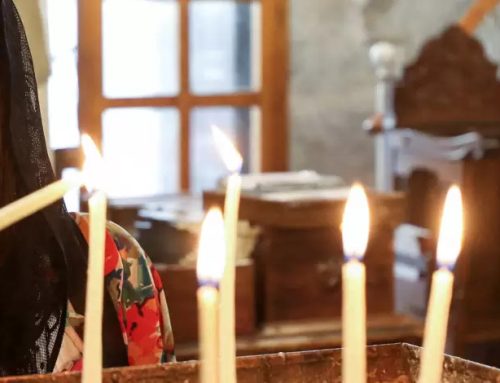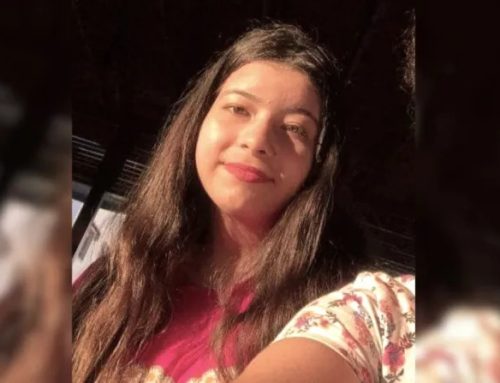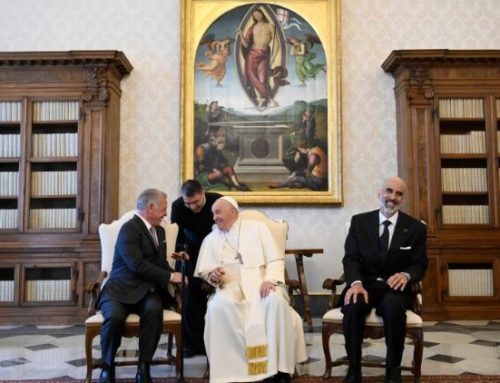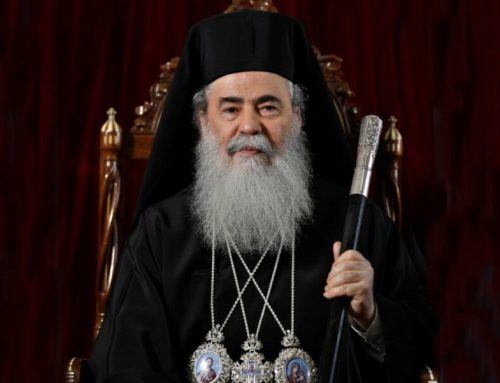As the world is deluged on a near-daily basis with new tales of famine, war, political oppression and human rights crises throughout the world, one region has long lingered in the headlines, creating an ennui with many Americans that has pushed concern for the people of this region to the back of the line of those in desperate straits. But in the end, it may be children who renew in us the urge to work for peace and justice in Palestine. In recent years an increasing number of parishes have taken an interest in the plight of the Palestinian people — whether Christian or Muslim — and through formal and informal programs have set about to educate themselves about that region. Along the way, they have created lifelong ties.
Local parishes and schools discover that the plight of the Palestinian people has reason to weigh upon us all
As the world is deluged on a near-daily basis with new tales of famine, war, political oppression and human rights crises throughout the world, one region has long lingered in the headlines, creating an ennui with many Americans that has pushed concern for the people of this region to the back of the line of those in desperate straits.
But in the end, it may be children who renew in us the urge to work for peace and justice in Palestine.
In recent years an increasing number of parishes have taken an interest in the plight of the Palestinian people — whether Christian or Muslim — and through formal and informal programs have set about to educate themselves about that region. Along the way, they have created lifelong ties.
Since Cincinnati pastor Father Rob Waller took his first trip to the Middle East in the mid-1990s, he has been dedicated to finding ways to introduce his parishioners to the region. He began by leading groups of area Catholics on trips to the Holy Land that would allow them to meet the people not simply visit tourist sites. More recently, he has worked with the Holy Land Christian Ecumenical Foundation to help acquaint local parishes with the work of HCEF. Father Waller’s parish, St. Andrew in Milford, sponsored HCEF’s Fifth International Conference, and St. Andrew parishioner Kristin Woodard has been urging local parishes to host sales of olive wood crafts made by the Palestinian people. This year 22 parishes have committed to the effort.
St. Andrew parishioners sponsor students in the Child Sponsorship Program, and several members of St. Andrew church are engaged in planning a pilgrimage to the Holy Land.
Last year, St. Andrew parish and school sponsored five students and their teacher from Beit Jala, Palestine to live in their homes, worship in their church and attend their school. In addition to building a long-term bridge of solidarity, this sponsorship brought the plight of Palestinian Christians to the front pages of Ohio’s newspapers and led to the development of an on-going Children’s Peace Project at HCEF, noted Father Waller.
St. Andrew parish is a model for partnership in its activities to support the Mother Church because of the active commitments of many of its members, including: Nancy Hemminger, Donna Beebe (school principal), Carol McNeal (parish pastoral council president), the five families from Beit Jala, the five host families from Milford, the parish of St. Andrew and the Holy Land Outreach Committee of St. Andrew, he said.
Carol McNeal’s teenage daughter was so affected by what she learned from the parish that she has single-handedly sponsored a Palestinian student’s Christian education, sending her own money each month to Beit Jala.
Nancy Hemminger is now the chair of the HCEF Children’s Peace Project, the exchange student program. She is writing a handbook for other parishes to use, aid Father Waller.
At Assumption Parish in Mount Healthy, six Palestinian students and their teacher spent part of last month in Cincinnati through this Beacons of Hope Program.
The visit, coordinated by Franciscan Sister Marietta Sharkey, parish DRE, and the support of Bill Walborn, school principal, was life-changing for all involved.
“This is the best thing I’ve ever done,” said Sister Marietta. “This is speaking a word of hope! This certainly is the most Franciscan thing I have ever done in trying to bring more peace in the world for these our brothers and sisters who are suffering so much.”
Visiting students George, Firas, George, Maryann and Angie were 13 years old; Reneen was 10. They were selected to spend two months in the U.S. through HCEF in the hopes they could give voice to the dreams of Palestinian children, whose lives are filled with checkpoints, bombings, shootings, poverty, religious and ethnic discrimination and numerous other hardships.
At a farewell assembly at Assumption, host families spoke eloquently about the preconceptions they had begun with, which were quickly shattered by the presence of these young people. Political issues in the media have taken on a human face, they explained, and for that reason they can never ignore the issues of that region again.
Firas was eager to talk about his Palestinian home but described the unrest in his country. “It’s a hard life,” he said. “It’s a difficult life. So scary.”
On their way to the United States, the six students were stopped at a checkpoint in Tel Aviv, Israel. Firas said the Israeli soldiers singled him out. They took him to a room, made him take off his clothes and searched him. “I’m always scared,” he said.
The most vocal of the group, he called the wall separating the Palestinian territories from Israel “the isolating wall.” He was referring to the security wall Israel is building. Eventually it will stretch more than 400 miles along the Israeli border and deep into the West Bank.
“Israel has hospitals,” he said. “We are not allowed to go to the hospitals. We must stop at many checkpoints.” He spoke calmly, matter-of-factly, about the curfew and the soldiers who enforce it. “If you open the door or look from your window, they will kill you without reason,” he said.
Yet, despite the turmoil in their homeland, the kids are proud to live in the Holy Land.
“We are so lucky to live in Palestine because this is where Jesus lived!” Angie exclaimed. Her friend, Mariana, Firas ‘ cousin, agreed. “I can’t go from my country,” she said. “This is where Jesus was born, where Jesus walked and talked and taught the people.” The two girls, who met through their travel to the United States, have become good friends in the last month and a half. When they return to the Palestinian territories, they will not be able to see each because they live on opposite sides of the wall.
Raneen was born in Boston, but her family moved back to the Middle East when she was 2. “We went back to Palestine because my family is there. Palestine is my country,” the young girl said.
Many of the Palestinian students talked about their desire to see Jerusalem. Firas explained that there are seven checkpoints to get from where he lives in Beit Sahour to Jerusalem. The soldiers, he said, can tell people to go home at any checkpoint.
Mostly, these youngsters say they just want peace. “I wish to live like any children in the world,” Angie said. “I need to live in peace.”
Vice principal Suhair Khoury, who is leading the group, wants Palestinian and Israeli officials to sit down to peace talks with the United States and the United Nations.
“We want Palestine and Israel to live side by side,” she said. “We have to sit together.”
“Jesus is our life in Palestine. He’s walking with us and walking with me,” Firas declared. “We just need you to pray.”
Other parishes joining the effort
St. Susanna Parish in Mason has also begun a twinning situation with the parish of Holy Rosary in Karak in Jordan, and Milford’s St. Elizabeth Ann Seton Parish is actively engaged in HCEF fundraising and student sponsorship.
Late last summer, Father Emil Salayta, international outreach director for HCEF, paid a visit to Cincinnati and stayed at St. Andrew Parish. There, he spoke at Masses and told parishioners about the good their efforts have accomplished. He also spoke at St. Susanna and at an informational evening at St. Elizabeth, where some 43 parishioners signed up to sponsor a Palestinian student’s education through HCEF.
Father David Sunberg, pastor of St. Elizabeth, was thrilled when Father Salayta gifted him with a chalice made of olive wood. The gift was particularly appropriate, he told his parishioners, since it is “through the Eucharist that we are all united.”
That unity is what Father Salayta says the Holy Land is in need of right now. He tells prospective tourists that despite concerns about their safety, “this is the time we need you to come to visit, to show solidarity. We need you to be with us in our difficult days, and we need to be with you — before it’s too late.”
“Maybe if groups come and use local guides from the Christian community, rather than the Israeli guides, they will see the way the Palestinians really live,” he said. “We can build bridges, build relationships.”
Father Salayta, who was born into a Bedouin family in Jordan, has served as a pastor in Jifna on the West Bank and directed several schools in Palestine. He is currently studying for his doctorate in Rome. He is co-founder of the HCEF and has served as director of education for the Latin Patriarchate in Jerusalem.
With HCEF based in Maryland, Father Salayta travels throughout the U.S. in an effort to educate Catholic parishes and schools about Christians in the Holy Land, and he also spends time trying to educate and lobby American officials. “Advocacy is a major part of the work of the foundation,” he said.
Members of Congress have told him that the U.S. supports Israel, he recounted. “Sometimes, saying ‘no’ to Israel is helping them to see it should end,” he said. There is also a double standard in place: “Why liberate Iraq when the plight of the Palestinians has been accepted for more than 50 years?”
He fears that change will only come “when Israeli forces grow sick of being the persecutors, the occupiers, and when the military pilots rise up and say they won’t bomb Gaza anymore.”
Interestingly, Father Salayta makes the point that the Palestinian people do not benefit from the suicide bombings carried out by extremists: Israel does, because it gives them justification for their actions.
He points with pride to the ecumenical successes of the Latin Patriarchate schools in the Middle East. “We have Christians and Muslims in school together,” he said. In the Palestinian territories there are 18,000 students in 40 schools and half of them are Muslim. Father Salayta does lament the fact that there are far too many days when the youngsters cannot travel to their schools because of restrictions and curfews on Palestinians.
He himself has experienced difficulty traveling through checkpoints, where one Israeli soldier once fired his gun in the air over the priest’s head to frighten him. Priests have been expelled from Israel, and some of the visas of seminarians have expired but the government won’t renew them. One priest’s mother died waiting in line at a checkpoint, and early last year, the Latin Patriarch himself was prevented from leaving the country.
“They don’t want him to speak,” Father Salayta said. “And any effort he makes to do so often backfires on us. They don’t want anyone working on behalf of Palestine.”
As a result of the lack of access to medical care, the unemployment, the violence and the obstacles to education, many Palestinians who can find ways to leave the region do so. “In the last three years, we have lost about 300 Christian families from Bethlehem,” he said.
Father Salayta received support from Cincinnati Archbishop Daniel E., Pilarczyk to push for the sale of olive wood crafts locally and to make parishes aware of the opportunities through HCEF for sponsorship and assistance. Detroit, Washington, D.C., Sioux Falls, Los Angeles, Houston, Baltimore, Atlanta and San Antonio are among the other dioceses opening their doors to the work of HCEF.
The child sponsorship program program requires that a teacher, a class, a school, family or individual commits to sponsoring a child’s education in the Latin Patriarchate schools. The cost is $25 per month.
The Beacons of Hope program pairs American Christian schools with their counterparts in the Holy Land. The objective is to develop a sense of Christian solidarity between the children. In the Beacons of Hope, the American children integrate this effort into their religion classes as a vehicle to exercise both spiritual and corporal works of mercy. For the children in the Holy Land, this program represents a vehicle to reach out in hope, to tell their story of their difficult situations, and to come to sense the hand of God extended to them through their counterparts in America.
Father Salayta also invites clergy to “travel to the Holy Land and witness what has happened.” Last January he escorted a group of U.S. bishops on such a trip. He is always willing to organize pilgrimages for people willing to make the trip and assures them “it’s very safe.” Developing parish-to-parish and Christian-to-Christian relationships is the best way to make the Christian world understand its obligation to Palestine, he said.
For more information on the work of HCEF, see their website at www.hcef.org. He suggests that local pastors contact Father Rob Waller for his insight into the agency’s work.
HCEF’s sixth annual conference held last month in Washington used the theme “Holy Land Christians, Rooted in Bonds of Peace,” to celebrate the foundation’s growth in a six-year-period from an organization investing $160,000 to support the Holy Land Christians to one providing $2 million in services this year.
The conference also marked the first time that the heads of the four main Christian churches in Jerusalem came together for an event in the United States.
“We work together all the time in Jerusalem,” said Latin Patriarch Michel Sabbah of Jerusalem. But he said it was the first time he and Episcopal Bishop Riah H. Abu El-Assal, Lutheran Bishop Munib A. Younan and Archimandrite Innokentios, personal representative of Greek Orthodox Patriarch Irineos of Jerusalem, had been at the same U.S. event. The four religious leaders urged U.S. Christians to build bridges of solidarity between Arab and Western Christians, to bring consolation to both the Israelis and the Palestinians and to give good counsel to our nation’s administration in order to act for the benefit of both peoples.
“At the first Pentecost, Arabs from 17 areas were present; the Americans weren’t there,” Bishop El-Assal said. “But you came (to this conference) and you’re the most powerful, and to those which more has been given, much is expected.”

